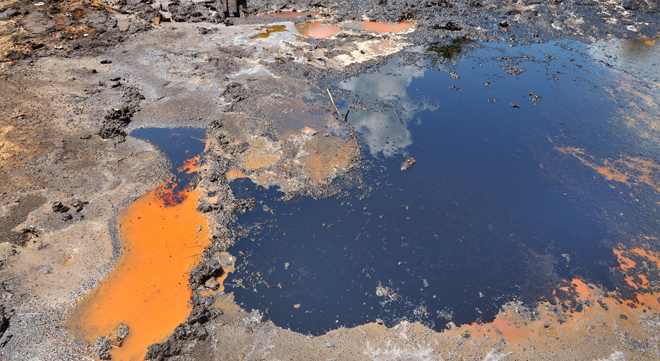Contracts of insurance typically exclude liability where the loss or damage was not sudden or unforeseen, and it is not uncommon for disputes over the validity of a claim to centre on unforeseen loss versus gradual wear and tear. The High Court in Johannesburg recently considered the meaning of the word “sudden” in a case between Transnet and Santam.
Transnet ended up paying some R7.4 million to rehabilitate soil contaminated by aviation fuel after thieves made an incision – apparently using a hacksaw – in an underground pipeline. The thieves dug a hole to access the pipeline and collected the fuel as it gradually pooled in the hole. The fuel seeped into the surrounding soil.
The polluted land belonged to a third party, and Transnet had registered a servitude over the land through which the pipeline ran.
It was not known for how long the thieves had siphoned off the fuel. The parties agreed to regard 28 January 2011 as the date of occurrence and of discovery.
Transnet notified Santam of the occurrence on 7 April 2011, by which date the state-owned logistics company had incurred clean-up expenses of R246 051. Transnet submitted it arranged and paid for the soil rehabilitation to comply with its responsibilities under the National Environmental Management Act.
Over the next three years, there were various exchanges between the parties until March 2014, when Santam denied liability and repudiated Transnet’s claim for current and any future rehabilitation expenses. By then, the rehabilitation bill had reached the region of R4m.
Transnet took Santam to the High Court, seeking to recover the money it spent to rehabilitate the soil.
Santam’s reasons for rejecting the claim
In the High Court, Santam referred to the policy’s terms and conditions to support its reasons for refusing to indemnify Transnet. These grounds were:
- It was not liable for a purely statutory obligation imposed on Transnet for pollution rehabilitation costs.
- Santam was obliged to indemnify Transnet against liability to pay compensation arising from damage to property, but the occurrence was not damage to property.
- There was no indemnity for liability for damage to property directly or indirectly caused by pollution or contamination unless such pollution or contamination was caused by a sudden, unintended and unexpected happening. This was not the case.
- Transnet was required to give Santam written notice “as soon as reasonably practicable” of any occurrence that may give rise to a claim. To the extent that Transnet only notified it of the occurrence on 7 April 2011, it contends that Transnet failed to give notice as soon as it was reasonably practicable.
- Santam’s liability to indemnify Transnet was contingent upon the latter not making any admission, offer, promise or payment without its written consent. Insofar as Santam did not give any written approval to Transnet to make the payments for which it sought indemnity, Transnet violated one of the terms of the contract.
How to understand ‘sudden’
Here, we will look at the High Court’s approach to the issue of whether a sudden, unintended and unexpected happening gave rise to the pollution damage, as contemplated by the insurance contract.
Santam submitted that the occurrence:
- Was not sudden, because the escape of the fuel from the incision was deliberately controlled by the thieves, causing the discharge to happen over an extended period;
- Was intended because the thieves’ objective was to continue stealing the fuel for as long as they remained undetected; and
- Was expected because the thieves anticipated to receive the fuel from the cut pipeline.
The court took the view that, in the context of the insurance contract, the word “sudden” had the meaning adopted by the Supreme Court of Appeal (SCA) in African Products (Pty) Limited v AIG South Africa (Pty) Limited (2009). It should be understood to mean “abrupt”, or “occurring quickly”, or “taking place all at once”.
The High Court said it would be useful to reproduce the example given by the SCA in the African Products case because it was similar to the matter at hand:
“Were a motor which drives a conveyor belt in the production line in the plant to stop running suddenly and without warning (unexpectedly) and it is subsequently discovered that a new screw inside the motor had snapped, causing other pads to be dislodged, the insurer would be liable to indemnify the insured for lost production while repairs to the motor were being effected. The physical damage that would have occurred as a result of the snapping of the screw would have been both unforeseen and sudden.
“Were it to be found, however, that a screw inside the motor had broken as a result of wearing out over a period, then the physical damage, though unforeseen, would not have been ‘sudden’. The wearing out would have happened over time but would only have ‘manifested itself when the screw eventually broke. In this scenario, the insurer would not be liable to indemnify the insured for loss of production. The fact that the physical damage (wearing out) was undiscovered until the screw broke does not make the breaking sudden.”
The High Court rejected Transnet’s assertion that “sudden” should be understood to mean that the seepage did not happen as a result of wear and tear, such as corrosion of the pipeline.
It said the event covered by the policy was the seepage that caused the pollution, not the puncturing of the pipeline. The escape of the fuel was gradual and so was the seepage.
For this and other reasons, the court dismissed Transnet’s claim, with costs.



